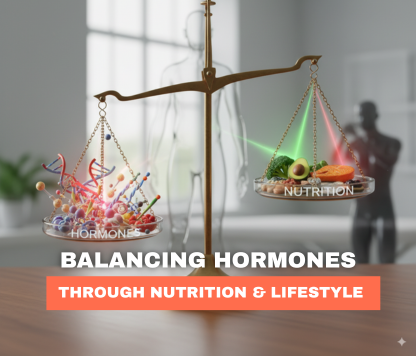Hormones are the body’s chemical messengers. They regulate everything from energy levels and mood to weight, fertility, and sleep quality. When your hormones are out of balance, you may experience fatigue, mood swings, stubborn weight gain, low libido, acne, or digestive issues.
While medication and medical treatment may be necessary for some conditions, many people overlook the powerful role of nutrition and lifestyle habits in restoring hormonal harmony. By making intentional choices, you can support your endocrine system naturally and improve your overall well-being.
Below, we’ll break down how food and lifestyle practices can help you maintain balanced hormones.
Understanding Hormonal Balance
Hormones are secreted by glands such as the thyroid, adrenal glands, pancreas, and reproductive organs. These hormones—including insulin, cortisol, estrogen, progesterone, and thyroid hormones—work in a delicate balance.
Stress, poor diet, lack of sleep, and environmental toxins can disrupt this balance, leading to symptoms and long-term health issues. The good news? Simple, sustainable changes can help restore equilibrium.
Nutrition for Hormonal Health
Food is not just fuel; it’s information. Every bite sends a message to your hormones. Here’s how to optimize your diet:
Eat Enough Protein
Protein provides amino acids necessary for hormone production and helps regulate appetite and blood sugar.
- Include lean meats, eggs, Greek yogurt, legumes, tofu, or tempeh in each meal.
Focus on Healthy Fats
Hormones are built from fat. Consuming the right kinds supports production of estrogen, progesterone, testosterone, and cortisol.
- Sources: avocados, nuts, seeds (flax, chia, pumpkin), olive oil, fatty fish (salmon, sardines).
- Omega-3 fatty acids reduce inflammation, which can positively affect hormone function.
Prioritize Fiber
Fiber helps your body metabolize and eliminate excess hormones like estrogen and keeps blood sugar stable.
- Load up on vegetables, fruits, beans, and whole grains.
Manage Carbohydrate Quality
Highly processed carbs can spike insulin, disrupt blood sugar, and contribute to hormone imbalance.
- Opt for slow-digesting carbs like quinoa, oats, sweet potatoes, and brown rice.
- Pair carbs with protein and fat to reduce glucose spikes.
Minimize Added Sugar
Excess sugar increases insulin and cortisol, which may worsen conditions like PCOS, adrenal fatigue, and weight gain.
- Read labels and limit sugary drinks, desserts, and refined snacks.
Support Your Gut
A healthy gut microbiome helps metabolize hormones and reduce inflammation.
- Include fermented foods like yogurt, kefir, sauerkraut, kimchi, or miso.
- Consider a high-fiber, prebiotic-rich diet to feed good bacteria.
Micronutrient Powerhouses
Certain vitamins and minerals are essential for hormone regulation:
- Magnesium (leafy greens, almonds) for stress and sleep.
- Zinc (pumpkin seeds, seafood) for thyroid and reproductive health.
- B vitamins (whole grains, eggs) for energy metabolism.
Lifestyle Habits to Support Hormonal Balance
What you do daily is just as important as what you eat. Here’s how lifestyle choices impact hormones:
Manage Stress and Cortisol
Chronic stress keeps cortisol elevated, disrupting other hormones like thyroid and sex hormones.
- Practice mindfulness, meditation, prayer, deep breathing, or yoga for 5–10 minutes daily.
- Schedule breaks and prioritize leisure activities.
Get Quality Sleep
Hormones like growth hormone, melatonin, cortisol, and insulin reset during sleep.
- Aim for 7–9 hours per night.
- Create a sleep routine: dim lights, limit screens, and keep your bedroom cool and dark.
Move Your Body Consistently
Regular exercise improves insulin sensitivity, supports thyroid function, and helps regulate sex hormones.
- Mix strength training (2–3x/week) with low-impact movement like walking, cycling, or yoga.
- Avoid chronic over-exercising, which can spike cortisol.
Balance Your Circadian Rhythm
Exposure to natural light in the morning and minimizing blue light at night helps synchronize your internal clock, benefiting hormones like melatonin and cortisol.
Limit Environmental Toxins
Endocrine disruptors in plastics, cosmetics, and household products can mimic or block hormones.
- Use glass or stainless steel for food storage.
- Choose natural or low-tox personal care products when possible.
Maintain a Healthy Body Weight
Excess body fat, particularly visceral fat, can produce estrogen and inflammatory chemicals that upset hormonal balance. Focus on gradual, sustainable weight management through balanced eating and movement.
Specific Hormone-Focused Tips
- For Insulin: Eat balanced meals, avoid excessive refined carbs, include protein and fiber.
- For Cortisol: Reduce caffeine, prioritize rest, practice stress management techniques.
- For Thyroid Health: Ensure adequate iodine (seafood, iodized salt) and selenium (Brazil nuts).
- For Reproductive Hormones (Estrogen/Progesterone): Support liver detoxification with cruciferous vegetables (broccoli, kale, cauliflower) and reduce alcohol.
Building Hormone-Balancing Habits
Small steps compound over time. Start with one or two changes:
- Swap sugary breakfast cereals for eggs and vegetables.
- Add a daily 10-minute walk after meals.
- Introduce meditation before bedtime.
- Replace plastic water bottles with stainless steel.
Track your energy, mood, and sleep over a few weeks. These are often the first signs your hormones are recalibrating.
When to Seek Professional Help
While nutrition and lifestyle habits can do a lot, persistent symptoms may require medical evaluation. If you experience severe fatigue, unexplained weight changes, irregular cycles, or mood disturbances, consult a healthcare professional. Functional medicine practitioners or endocrinologists can test hormone levels and provide targeted support.
Key Takeaway
Balancing hormones naturally isn’t about strict diets or punishing routines—it’s about nourishing your body and creating supportive daily habits. A nutrient-rich diet, stress management, quality sleep, regular movement, and toxin reduction together create the foundation for hormonal harmony. Over time, these shifts not only restore internal balance but also improve energy, mood, weight management, and long-term health.





